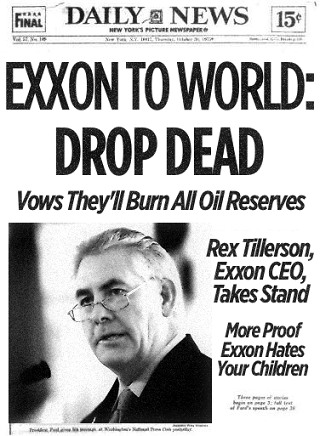Exxon and Climate Change: Does the Criminal Case Have Merit?

Yes they are, but it’s not clear how long that is going to stay in place. Yesterday, the largest public university in the U.S. (U. of Massachusetts) divested itself of all fossil fuel holdings, following a string of dozens of large institutional investors–and divestiture is only one of many different forces that will soon come to exert enormous pressure on Exxon and its fellows.

Craig,
There will always be investors and institutions who don’t invest in various enterprises for “ethical ” reasons. That’s the right of any investor. As long as other institutions and individuals exist to replace that level of investment, there’s no problem.
The share price of Oil Companies has been more affected by the low price of oil due to oversupply than any “ethical” investor movement.
In fact, for Exxon the departure of such shareholders is probably welcome. I would imagine the voluntary removal of stakeholders with agendas distracting from the company’s core business, would create no sorrow with the board!
Nor did these institutions sell at a loss, which indicate plenty of other eager buyers.
That would seem to be fairly convincing evidence to dispel any concept Exxon is “hurting’ from the departure of a small minority of ethical investors.
Nor is the issue simple. If oil companies suddenly became unprofitable, or even significantly less profitable, the US economy would receive a shock that would make the great depression appear mild in comparison.
Oil industry revenue underpins most of the US economy. Not only is the oil industry the largest generator of tax revenue, but most of the US retirement and superannuation industry is dependent on oil industry profits to remain viable.
This is fastest growing US demographic (70 millions citizens and growing). These citizens vote. Strangely, retirees may not find the concept of an “ethical”, but impoverished lifestyle attractive! Nor could US society support such a burden placed on taxpayers.
What happens when the University of Massachusetts discovers it’s “ethical” investments don’t pay the sort of high yield, reliable dividends it was accustomed to receive?
Will it simply tighten belts, reduce salaries and live on principles ? Will it also divest shares in Apple, Google, Microsoft etc, for unethical (but legal)tax avoidance practices ? Or will the just go bleating to the US taxpayer to pay for its “principles”.
The oil industry is deeply woven into every aspect of the US economy, not because of some Machiavellian plot, but simply because historically the Oil industry created the modern US economy.
The complexities of economic disengagement are far beyond the bleating and ill-informed rants by amateur social engineers ! Those who gleefully desire the destruction of the US (and western economies) just to fulfill hate-filled, misanthropic fantasies of a utopia where their own inadequacies can be overlooked, are more of a threat than fundamentalist terrorists. ( hmmm… this ranting business can get quite addictive 🙂
Oil companies like Exxon are the largest US taxpayers, and most of the wealth generated stays in the US. (Unlike Google, Apple etc ).
The processing of imported oil to be re-exported as petroleum products is very valuable to the US economy, not only earning foreign revenue and employing US workers, but making possible the export of high priced US manufactured goods to oil producing nations, thus making US manufacture remain competitive and viable.
Moving to a future with an increasing reduction of fossil fuels to produce energy will be very difficult and present many complex issues.
Approaching such complex issues problems with simplistic “crusader” attitudes, will, at best, produce the same results as the original crusades, very little benefit, but a lot of devastation and long term harm.
As you noted, that was quite the rant, ironic insofar as you’re normally criticizing me for my hyperbolic language. Feels kinda good, doesn’t it? 🙂
Seriously, I’ll post something on this later.